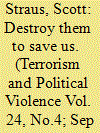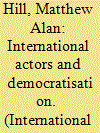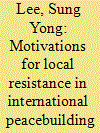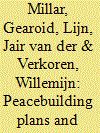| Srl | Item |
| 1 |
ID:
114672


|
|
|
|
|
| Publication |
2012.
|
| Summary/Abstract |
Based on an analytic review of recent scholarly advances in genocide studies, this article investigates the causes, concept, and logic of genocide while suggesting a set of theoretical propositions and avenues for future research. Two emerging theoretical streams of literature on causes-strategic and ideological-highlight different dimensions of genocide and should be thought of as compatible. The study of genocide should be embedded in a broader study of political violence; the two literatures have been strangely cloistered from each other. To that end, genocide should be conceptualized as group-selective, large-scale violence whose purpose is group destruction. This stands in contrast to violence that is individually selective or indiscriminate; small-scale and not sustained across time and space; and whose purpose is repression, communication, or some other outcome short of group destruction. To develop existing theory and to bring the study of genocide closer to the literature on violence, studying variation in outcomes is essential; that is, students of genocide should ask why genocide and not another outcome occurs, rather than only studying common patterns among genocide cases. Similarly, rather than study primarily sources of escalation and accelerators of violence, scholars should also theorize restraint and decelerators of violence. Further, scholars of genocide should focus attention on the interaction between national and sub-national actors as well as periods of escalation or de-escalation. In these ways and others proposed in the essay, genocide studies can build on recent gains and develop a broader and more coherent field of theoretical inquiry.
|
|
|
|
|
|
|
|
|
|
|
|
|
|
|
|
| 2 |
ID:
097806


|
|
|
|
|
| Publication |
2010.
|
| Summary/Abstract |
Externally driven state-building is a complicated task that rarely fulfils the declared objectives of the international actors or the local state and society. This paper critiques the international dimension to state-building by examining USAID in Afghanistan and identifying the theoretical and practical explanations for its failure to aid democratic consolidation. Arguing that the Bush administration's democratisation efforts have had a negative impact on consolidating democracy, this paper identifies the democratic product of Afghanistan as characterised, at most, by having the formal institutions, routines and procedures of a democracy. I suggest that this merely 'formal' democratic product is too short-term and fails to take fully into account the need to develop a political and social culture capable of supporting democratic institutions. In terms of the future of democracy promotion in US foreign policy, I suggest that a change of emphasis may be occurring in the Obama administration.
|
|
|
|
|
|
|
|
|
|
|
|
|
|
|
|
| 3 |
ID:
140963


|
|
|
|
|
| Summary/Abstract |
This article discusses the complex motivations underlying local resistance to externally led post-war peacebuilding programmes. In examining the land distribution process in post-war Cambodia it proposes a five-part typology of motivations for the resistance that frequently appears in the context of international post-conflict peacebuilding processes. The article also argues that a single campaign of resistance is likely to involve multiple actors with multiple motivations.
|
|
|
|
|
|
|
|
|
|
|
|
|
|
|
|
| 4 |
ID:
123990


|
|
|
|
|
| Publication |
2013.
|
| Summary/Abstract |
What happens when global meets local? This special issue focuses on the dynamic interaction between externally conceived plans for peacebuilding intervention and local people's own approaches and strategies. The notion of 'friction' provides a perspective that acknowledges the unpredictable and unexpected nature of this interaction. The 'hybrid' outcomes of such dynamic interactions can vary in extent and success, as peacebuilding plans are rerouted and redesigned in practice. This special issue explores how, why, and to what effect internationally designed, funded, or administered peace projects interact with and/or are appropriated by local actors.
|
|
|
|
|
|
|
|
|
|
|
|
|
|
|
|